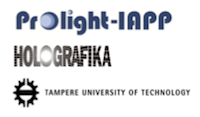 The first PROLIGHT Workshop on Modern Signal Processing Methods for Ultra-realistic 3D Displays is organized jointly by the PROLIGHT-IAPP Marie Curie Action and the 3D-ConTourNet COST Action.
The first PROLIGHT Workshop on Modern Signal Processing Methods for Ultra-realistic 3D Displays is organized jointly by the PROLIGHT-IAPP Marie Curie Action and the 3D-ConTourNet COST Action.
Workshop chairs
Atanas Gotchev and Jaakko Astola, Tampere University of Technology, Finland
Workshop synopsis
The ultimate aim of visual media technologies is to achieve higher realism of the reproduced visual scenes in order to involve the user in the story being told or to help him/her to accomplish some task in a more productive way. Ultra-realistic 3D displays are expected to recreate an exact optical replica of the visual scene, therefore they constantly require capture and processing of vast amount of multi-modal data. Such data is available only for computer-generated scenes, while the creation and manipulation of real-life scenes is still problematic. In order to fill the gap between creation and manipulation of rich visual content and its highly-realistic visualization, there is a need to understand the complexity of the data and how it is constrained by the available capture equipment and the target display.
The PROLIGHT workshop addresses the problems of capture, analysis, modelling, compression and visualization of light fields of real-world scenes. It gathers together researchers aiming at advancing the theory of light-field modelling and its practical application on next-generation 3D displays. The workshop is a venue for presenting novel methods and techniques based on modern signal processing theory made operational for modern 3D displays.
Workshop agenda
Tuesday, 29 October 2013
11:30 – 11:35 Opening, Atanas Gotchev
11:35- 12:00 Latest development in 3D content representation and processing, Robert Bregovic, Tampere University of Technology, Finland and Holografika, Hungary
12:00 – 12:25 Lightfield media production, Michael Schöberl, Fraunhofer IIS, Germany
12:25 – 12:50 Content creation challenges for 3D light-field displays; Peter Kovacs, Holografika, Hungary and TUT, Finland
12:50 – 13:10 Plenoptic function reconstruction from non-uniform distributed samples, Suren Vagharshakyan, Tampere University of Technology, Finland
13:10 – 13:30 Design of high-speed full-parallax 3D visualization test setup for subjective experiments, Atanas Boev, Tampere University of Technology, Finland
Wednesday, 30 October 2013
10:30 – 10:55 QoE for 3D media, Patrick Le Callet, University of Nantes, France
10:55 – 11:30 Imaging and display of 3D micro and macro scenes, M. Martinez-Corral, H. Navarro, A. Llavador, A Dorado, and G. Saavedra, University of Valentia, Spain
11:30 – 11:45 A Novel Scene Representation For Digital Media, Christopher Haccius, Intel Visual Computing Institute, Germany
11:45 – 12:10 Compression of light field images, Yun Li, Roger Olsson, Mårten Sjöström, and Ulf Jennehag, Mid Sweden University, Sweden
12:10 – 12:35 Modeling of plenoptic capture systems, Mitra Damghanian, Roger Olsson, and Mårten Sjöström, Mid Sweden University, Sweden
